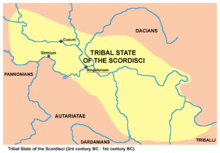
Back Escordiscos AN Скордиски Bulgarian Skordisci BS Escordiscs Catalan Skordiskové Czech Scordisci Welsh Skordisker German Scordisci English Skordiskoj Esperanto Escordiscos Spanish

Skordisker, på latin scordisci, var en keltisk[1][2][3][4] stamme, ifølge visse kilder af thrakisk[5] eller illyrisk[6] herkomst. En anden teori er, at skordiskerne skulle have udgjort en stammesymbiose af keltiske, illyriske og thrakiske kulturelementer.[7] De beboede området i det nuværende nordlige Serbien, Ungarn, østlige Kroatien, nordøstlige Bosnien og Hercegovina, samt dele af nutidens Rumænien og Bulgarien. Skordiskerne etablerede sig især mellem floderne Sava, Drava og Donau.
Antikkens forfattere fortæller, at skordiskerne var blodtørstige og gjorde menneskeofre.[8]
De kom 179 f.Kr. i kamp med romere ved at bistå den makedoniske konge Perseus, og kampene fortsatte længe. M. Cosconius slog dem 135, Sextus Pompeius, måske Cn. Pompeius Magnus' farfar, døde i krig med dem 118. De besejrede 114 Caius Porcius Cato, men blev 107 slåede af Quintus Minucius Rufus. De vovede til og med at plyndre templet i Delfi, men Scipio Asiaticus slog dem fuldstændigt 88 f.Kr. og fordrev dem hinsides Donau. Også fra disse egne blev de til sidst fordrevne af dakerne. De omtales endnu på kejser Hadrianus' tid.
- ^ Council of American Overseas Research Centers
- ^ Wilkes, J. J. The Illyrians, 1992, ISBN 0-631-19807-5, Page 140, "... Autariatae at the expense of the Triballi until, as Strabo remarks, they in their turn were overcome by the Celtic Scordisci ..."
- ^ Wilkes, J. J. The Illyrians, 1992, ISBN 0-631-19807-5, page 84: "...Celtic Scordisci away from the river Danube..."
- ^ "Pannonia and Upper Moesia. A History of the Middle Danube Provinces of the Roman Empire. A. Mocsy. London and Boston, Routledge and Kegan Paul. ISBN 0-7100-7714-9. Pg 12 "the Scordisci ... are to be regarded merely one of the Celts' political creations and not as a Celtic tribe..."
- ^ The Cambridge Ancient History, Volume 3, Part 2: The Assyrian and Babylonian Empires and Other States of the Near East, from the Eighth to the Sixth Centuries BC by John Boardman, I. E. S. Edwards, E. Sollberger, and N. G. L. Hammond, 1992, page 599, "...suggests that their origin is Serbo-Thracian rather than Illyrian..."
- ^ The Cambridge Ancient History, Volume 3, Part 2: The Assyrian and Babylonian Empires and Other States of the Near East, from the Eighth to the Sixth Centuries BC by John Boardman, I. E. S. Edwards, E. Sollberger, and N. G. L. Hammond, 1992, page 599, "... formally describes them as Illyrians, but in the same passage he describes the Scordisci also as Illyrians. This opinion can be accounted for by ..."
- ^ The Celts: a history by Dáithí Ó hÓgáin, 2003, page 60, "... element among the more numerous local populations of Thracians and Illyrians. The most powerful such new group of mixed Celts was the Scordisci..."
- ^ The Central Balkan Tribe in Pre-Roman Times: Triballi, Autariatae ... - Fanula Papazoglu - Google Bøger